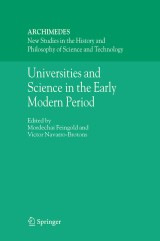Details

Universities and Science in the Early Modern Period
Archimedes, Band 12
|
149,79 € |
|
| Verlag: | Springer |
| Format: | |
| Veröffentl.: | 03.10.2006 |
| ISBN/EAN: | 9781402039751 |
| Sprache: | englisch |
| Anzahl Seiten: | 310 |
Dieses eBook enthält ein Wasserzeichen.
Beschreibungen
This book includes most of the contributions presented at a conference on “Univ- sities and Science in the Early Modern Period” held in 1999 in Valencia, Spain. The conference was part of the “Five Centuries of the Life of the University of Valencia” (Cinc Segles) celebrations, and from the outset we had the generous support of the “Patronato” (Foundation) overseeing the events. In recent decades, as a result of a renewed attention to the institutional, political, social, and cultural context of scienti?c activity, we have witnessed a reappraisal of the role of the universities in the construction and development of early modern science. In essence, the following conclusions have been reached: (1) the attitudes regarding scienti?c progress or novelty differed from country to country and follow differenttrajectoriesinthecourseoftheearlymodernperiod;(2)institutionsofhigher learning were the main centers of education for most scientists; (3) although the universities were sometimes slow to assimilate new scienti?c knowledge, when they didsoithelpednotonlytoremovethesuspicionthatthenewsciencewasintellectually subversivebutalsotomakesciencearespectableandevenprestigiousactivity;(4)the universities gave the scienti?c movement considerable material support in the form of research facilities such as anatomical theaters, botanical gardens, and expensive instruments; (5) the universities provided professional employment and a means of support to many scientists; and (6) although the relations among the universities and the academies or scienti?c societies were sometimes antagonistic, the two types of institutionsoftenworkedtogetherinharmony,performingcomplementaryratherthan competing functions; moreover, individuals moved from one institution to another, asdid knowledge, methods, and scienti?c practices.
“Mathematics for Astronomy” at Universities in Copernicus’ Time: Modern Atitudes Toward Ancient Problems.- The University of Salamanca and the Renaissance of Astronomy During the Second Half of the 15th Century.- Medical Science and Medical Teaching at the University of Salamance in the 15th Century.- The Faculty of Medicine of Valencia: Its Position in Renaissance Europe.- The Cultivation of Astronomy in Spanish Universities in the Latter Half of the 16th Century.- The Sphere of Jacques du Chevreul: Astronomy at the University of Paris in the 1620s.- Lectures and Practices. The Variety of Mathematical and Mechanical Teaching at the University of Uppsala in the 17th Century.- Mathematical Research in Italian Universities in the Modern Era.- Universities, Academies, and Sciences in Italy in the Modern Age.- Natural Philosophy and Mathematics in Portuguese Universities, 1550–1650.- Venetian Policy Toward the University of Padua and Scientific Progress During the 18th Century.- Candide in Caledonia: The Culture of Science in the Scottish Universities, 1690–1805.- The Sciences at the University of Rome in the 18th Century.- Enlightenment and Renovation in the Spanish University.- Spanish Chemistry Textbooks During Late 18th Century: Building up a New Genre of Scientific Literature.- Botany in University Studies in the Late 18th Century. The Case of Valencia University.- Scientific Education and the Crisis of the University in 18th Century Barcelona.- The Theories of Copernicus and Newton in the Viceroyship of Nueva Granada and the Audiencia De Caracas During the 18th Century.
<P>The past two decades have witnessed a striking re evaluation of early modern institutions of higher learning as impoverished intellectual centers, hostile to new modes of thought. The present volume offers the most comprehensive synthesis to date of the fecundity of early modern universities, their receptivity to novel scientific ideas, and their contribution to the critical dialogue that vitalized the emergent European scientific community. The "soul" of the early modern university was its well-rounded, humanistically informed curriculum and the culture of erudition it inculcated. The authors of this volume offer a fresh assessment of how this course of study affected generations of natural philosophers, from the Iberian Peninsula to Scandinavia, from Italy to Scotland, even as it was increasingly modified to accommodate the new science. The fresh evidence gathered here emphasizes just how rigorously science was pursued by academics, notwithstanding institutional constraints. Individually, each paper illustrates the nexus of complexities specific locales made on the reception and transmission of scientific ideas; collectively, the papers offer a comparative framework that should prove invaluable in our evaluating the profound changes undergone by early modern universities during the era of Scientific Revolution. </P>
<P></P>
<P></P>
Most comprehensive comparative account of scientific teaching in the early modern period Careful attention to the social and intellectual context of scientific ideas Unique in emphasizing the conditions in the Iberian peninsula for the English speaking world
Diese Produkte könnten Sie auch interessieren:

University Science and Mathematics Education in Transition

von: Ole Skovsmose, Paola Valero, Ole Ravn Christensen

96,29 €















